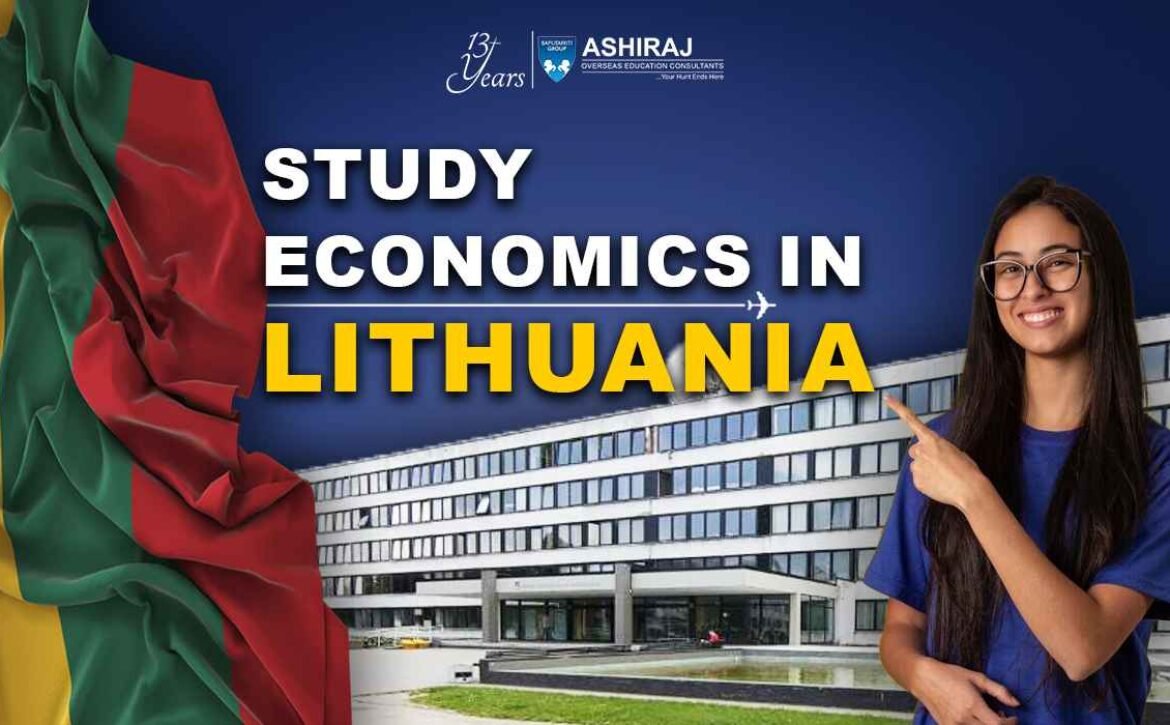
Economics in Lithuania
Exploring Economics in Lithuania unveils a narrative of resilience and transformation. Situated at the crossroads of Eastern and Western Europe, Lithuania has experienced a dynamic economic journey, marked by periods of transition and growth. From its post-Soviet era to its accession to the European Union in 2004, Lithuania has navigated significant economic reforms, fostering a market-oriented economy and attracting foreign investment. Today, Economics in Lithuania reflects a blend of traditional industries like agriculture and forestry with a burgeoning technology sector, showcasing the country’s adaptability in the face of global trends.
Economics in Lithuania encompasses a diverse array of sectors, underpinned by a commitment to innovation and sustainability. The country’s strategic location, coupled with its skilled workforce and investment-friendly policies, has propelled it as a key player in the Baltic region’s economic landscape. Embracing the principles of free trade and entrepreneurship, Lithuania continues to evolve, harnessing its human capital and fostering a competitive business environment conducive to long-term prosperity.
Why to Study Economics in Lithuania?
- Dynamic Economic Environment: Lithuania offers a unique blend of traditional and modern economic sectors, providing students with a diverse learning experience.
- Strategic Location: Situated at the crossroads of Eastern and Western Europe, Lithuania provides students with exposure to international trade dynamics and global economic trends.
- European Union Membership: As a member of the European Union, Lithuania offers access to a large market and opportunities for students to understand EU policies and regulations.
- Innovation and Technology: The country’s emphasis on innovation and technology presents students with the chance to explore cutting-edge economic concepts and practices.
- Affordable Education: Compared to other European countries, Lithuania offers relatively affordable tuition fees and living costs, making it an attractive destination for students.
- English-Taught Programs: Many universities in Lithuania offer economics programs taught in English, ensuring accessibility for international students.
- Cultural Diversity: Studying economics in Lithuania provides students with exposure to a rich cultural heritage and the opportunity to interact with peers from around the world.
- Career Opportunities: With a growing economy and a focus on entrepreneurship, Lithuania offers promising career prospects for economics graduates both domestically and internationally.
Top Universities to Study Economics in Lithuania
Rank | University | QS World University Rankings 2023 | Type of University | Average Annual Fees | Programs Offered |
1 | Vilnius University | 501-510 | Public | $2,000 – $4,000 | Economics, International Economics, Economic Policy |
2 | Kaunas University of Technology | 601-650 | Public | $2,500 – $5,000 | Economics and Business Management, Financial Economics |
3 | Klaipeda University | 801-1000 | Public | $2,000 – $3,500 | Economics, Business Economics, Maritime Economics |
4 | ISM University of Management | 1001+ | Private | $4,000 – $7,000 | Economics, Financial Economics, Business Administration |
5 | Vytautas Magnus University | 1001+ | Public | $1,500 – $3,000 | Economics, Applied Economics, Economic Analysis |
- Vilnius University: A prestigious public institution offering diverse economics programs at affordable fees.
- Kaunas University of Technology: Known for its focus on technology and innovation, providing economics and business management courses.
- Klaipeda University: Offers specialized programs in maritime economics along with traditional economics courses.
- ISM University of Management: A private university with a focus on business and management studies, including economics.
- Vytautas Magnus University: Provides a range of economics programs with a strong emphasis on applied economics and economic analysis.
Course Curriculum for Economics in Lithuania
- Foundational Concepts: Economics programs in Lithuania typically start with courses introducing students to fundamental economic theories, principles, and concepts.
- Microeconomics and Macroeconomics: Students delve into microeconomic topics such as supply and demand, market structures, and consumer behavior, as well as macroeconomic issues like inflation, unemployment, and fiscal policy.
- Quantitative Methods: The curriculum includes modules focusing on quantitative methods such as econometrics, mathematical modeling, and statistical analysis to equip students with analytical skills.
- Specialized Tracks: Many universities offer specialized tracks within economics, allowing students to focus on areas like international economics, financial economics, or economic policy.
- Research and Analysis: Students engage in research projects and case studies to apply theoretical knowledge to real-world economic scenarios, honing their analytical and critical thinking abilities.
- Interdisciplinary Perspectives: Economics programs often integrate interdisciplinary perspectives, incorporating elements from fields like sociology, political science, and environmental studies.
- Internships and Practical Experience: Some programs facilitate internships or practical experiences to provide students with hands-on exposure to economic practices and industries.
- Capstone Projects: Many programs culminate with capstone projects or theses, allowing students to demonstrate mastery of economic concepts and research skills.
Eligibility Criteria & Admission Requirements for MS in Economics in Lithuania
- Language Proficiency: Applicants are typically required to demonstrate proficiency in English through standardized tests such as IELTS or TOEFL.
- Standardized Test Scores: Many universities may also require scores from standardized tests like GRE or GMAT to assess applicants’ analytical and quantitative abilities.
- Educational Background: Applicants should hold a bachelor’s degree or its equivalent in economics or a related field from a recognized institution.
- Passport & Student Visa: International students must possess a valid passport and obtain a student visa to study in Lithuania. The visa application process may vary depending on the student’s country of origin.
- Academic Certificates: Applicants need to submit academic transcripts and certificates from previous educational institutions to verify their qualifications.
- Work Experience: While not always mandatory, some programs may prefer candidates with relevant work experience in economics or related fields.
- IELTS or TOEFL Scores: Minimum scores for IELTS are typically around 6.5 to 7.0, and for TOEFL, scores range from 80 to 100.
- GRE or GMAT Scores: Competitive GRE scores may range from 310 to 330, and GMAT scores from 600 to 700.
IELTS or TOEFL Scores:
Test | Minimum Score |
IELTS | 6.5 – 7.0 |
TOEFL | 80 – 100 |
GRE or GMAT Scores:
Test | Minimum Score |
GRE | 310 – 330 |
GMAT | 600 – 700 |
Documents Required for Studying Economics in Lithuania
- Passport: A valid passport is essential for international students applying to study economics in Lithuania.
- Two Letters of Recommendation (LOR): Applicants typically need to submit LORs from academic or professional referees who can attest to their skills and qualifications.
- Statement of Purpose (SOP): An SOP outlining the applicant’s academic background, career goals, and reasons for choosing to study economics in Lithuania is usually required.
- Curriculum Vitae (CV): A comprehensive CV detailing the applicant’s educational qualifications, work experience, research projects, publications, and other relevant achievements.
- Official High School Transcripts: Transcripts from the applicant’s high school or secondary education institution are necessary to assess their academic background.
- Educational Certificates: Certificates from previous educational institutions, including bachelor’s or master’s degrees, are required for admission.
- Work Experience Certificate: If applicable, a certificate verifying the applicant’s work experience in economics or related fields may be requested.
- Proof of Financial Resources: Applicants must demonstrate sufficient financial resources to cover tuition fees, living expenses, and other costs during their stay in Lithuania.
Ensuring that all these documents are in order is crucial for a smooth application process for studying Economics in Lithuania.
Admission Process for Economics in Lithuania
- Research Universities: Explore universities in Lithuania offering economics programs and compare their offerings, faculty, and admission requirements.
- Check Eligibility: Ensure you meet the eligibility criteria, including language proficiency, standardized test scores, and educational background.
- Prepare Required Documents: Gather all necessary documents such as passport, academic transcripts, certificates, letters of recommendation, statement of purpose, CV, and proof of financial resources.
- Submit Application: Complete the online application form provided by the university and upload all required documents before the deadline.
- Pay Application Fee: Some universities may require an application fee, which needs to be paid along with the submission of the application.
- Appear for Interviews (if applicable): Certain universities may conduct interviews as part of the admission process to assess the candidate’s suitability for the program.
- Receive Admission Decision: Wait for the university’s admission committee to review your application and provide an admission decision.
- Accept Offer and Apply for Visa: If accepted, follow the instructions to accept the admission offer and initiate the student visa application process.
- Plan Accommodation and Travel: Arrange for accommodation and plan your travel to Lithuania before the start of the academic term.
Following these steps diligently will help facilitate a successful admission process for studying Economics in Lithuania.
“Education is the most powerful weapon which you can use to change the world.”
Nelson Mandela
Cost of Economics Course in Lithuania
- Tuition Fees: The average annual tuition fees for economics programs in Lithuania range from $2,000 to $7,000, depending on the university and the level of study.
- Living Expenses: Living costs in Lithuania are relatively affordable compared to other European countries, estimated at around $400 to $700 per month for accommodation, food, transportation, and other expenses.
- Scholarships and Financial Aid: Many universities offer scholarships, grants, and financial aid packages to international students based on academic merit, financial need, or other criteria.
- Part-Time Work Opportunities: International students are allowed to work part-time while studying in Lithuania, which can help offset living expenses.
- Health Insurance: Health insurance coverage is mandatory for all students in Lithuania, and the cost varies depending on the provider and coverage level.
- Additional Expenses: Budget for additional expenses such as visa fees, travel expenses, books, study materials, and extracurricular activities.
- Exchange Rates: Keep in mind currency exchange rates when calculating expenses, as they can impact the overall cost of studying in Lithuania.
- Plan Wisely: Develop a budget plan and explore cost-saving measures such as shared accommodation, cooking at home, and taking advantage of student discounts to manage expenses effectively while pursuing Economics in Lithuania.
Understanding the cost structure and planning finances accordingly is essential for a smooth and affordable experience studying Economics in Lithuania.
Scholarships for Economics Courses in Lithuania
Scholarship Name | Amount | Application Deadline | Eligibility Criteria |
Vilnius University Scholarships | Up to $5,000 | May 31st | Available for international students applying to economics programs at Vilnius University. Must demonstrate academic excellence and financial need. |
Lithuanian Government Scholarships | Full tuition fee waiver + Monthly stipend | April 30th | Offered to outstanding international students for full-time Master’s studies in Lithuania. Must meet academic requirements and pass the competitive selection process. |
Kaunas University of Technology Scholarships | Variable | June 15th | Available for international students enrolling in economics programs at KTU. Criteria include academic merit, extracurricular activities, and motivation. |
Erasmus+ Scholarships | Varies | Varies (Check Erasmus+ website) | Provides funding opportunities for international students to study, train, or volunteer in Europe. Eligibility criteria and deadlines vary by program and country. |
ISM University Scholarships | Up to 50% tuition fee reduction | July 15th | Awarded based on academic excellence and potential contribution to the university community. Open to international students pursuing economics degrees at ISM University. |
Exploring these scholarship opportunities can significantly alleviate the financial burden of studying Economics in Lithuania, enabling students to focus on their academic pursuits.
Career Opportunities After Economics in Lithuania
Job Profile | Average Salary (per year) |
Economist | $28,000 – $45,000 |
Financial Analyst | $25,000 – $40,000 |
Market Researcher | $22,000 – $35,000 |
Policy Analyst | $30,000 – $50,000 |
Banking Professional | $30,000 – $50,000 |
Salaries are approximate and may vary based on factors such as experience, qualifications, and location.
Exploring career opportunities after completing a degree in economics in Lithuania opens doors to diverse and rewarding professions. Economists analyze economic data, trends, and policies to provide insights into financial markets, government policies, and business strategies. Financial analysts assess investment opportunities, analyze financial data, and make recommendations to clients. Market researchers gather and analyze data to understand consumer preferences, market trends, and competitor strategies. Policy analysts evaluate public policies, propose reforms, and assess their impact on the economy and society. Banking professionals manage financial transactions, provide financial advice, and ensure compliance with banking regulations. Pursuing these career paths can lead to fulfilling and lucrative opportunities for individuals passionate about Economics in Lithuania.
Frequently Asked Questions About Economics in Lithuania
Some of the top universities in Lithuania offering economics programs include Vilnius University, Kaunas University of Technology, and ISM University of Management.
Yes, many universities in Lithuania offer economics programs taught in English to cater to international students.
Eligibility criteria typically include a bachelor’s degree in economics or a related field, language proficiency (IELTS or TOEFL), and standardized test scores (GRE or GMAT).
Yes, there are scholarships offered by universities, the Lithuanian government, and organizations like Erasmus+ for international students studying economics in Lithuania.
The cost varies depending on the university and program but generally includes tuition fees, living expenses, health insurance, and additional expenses such as books and transportation.
Career opportunities include roles as economists, financial analysts, market researchers, policy analysts, and banking professionals, among others.
Yes, international students are allowed to work part-time while studying in Lithuania to support themselves financially.
The duration of economics programs in Lithuania varies depending on the level of study but typically ranges from three to four years for a bachelor’s degree and one to two years for a master’s degree.
Yes, several universities in Lithuania offer PhD programs in economics for students interested in pursuing advanced research and academic careers.
The application process involves researching universities, checking eligibility criteria, preparing required documents, submitting an application, and awaiting an admission decision.




